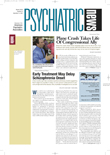How many people who become depressed also experience hallucinations, delusions, or both? Probably more than many general practitioners, and perhaps more than a number of psychiatrists, would expect, suggests a study reported in the November American Journal of Psychiatry.
The study was conducted by Maurice Ohayon, M.D., D.Sc., Ph.D., an associate professor of psychiatry at Stanford University School of Medicine, and Alan Schatzberg, M.D., Ph.D., chair of psychiatry at Stanford.
Between 1994 and 1999, the researchers conducted an extensive phone survey to learn more about sleep disorders and mental disorders in Europeans. The target population was noninstitutionalized residents aged 15 years or older in the United Kingdom, Germany, Italy, Portugal, and Spain.
The same two-stage sampling strategy was used for all five countries. In the first stage, the population was divided by geographic distribution, and then phone numbers were randomly drawn. In the second stage, within each sampled household a member was selected as a function of age and gender to maintain the representativeness of the sample. The overall participation rate of persons contacted was 80 percent—about 19,000 individuals.
The phone interviews were conducted with the help of the Teleperformance Group, a poll service company with several affiliates in Europe. Software developed by Ohayon, called the Sleep-EVAL expert system, was used to perform the interviews. It was based on the International Classification of Sleep Disorders and DSM-IV.
Questions and possible answers were displayed on a computer screen to lay interviewers, who read them to the subjects and entered subjects’ answers into the system.
Interviews began with general questions about demographic characteristics, followed with questions about sleeping habits. Then came questions regarding mental health; the final questions had to do with hallucinations and delusions.
After excluding subjects with substance abuse, bipolar disorder, or nonaffective psychosis, they found that about 2 percent of their subjects had a major depressive disorder; of this 2 percent, about 19 percent had psychotic features, yielding a prevalence of major depressive episode with psychotic features of 0.4 percent in the sample. There was no significant difference among the five countries surveyed in the prevalence of a DSM-IV major depressive episode with psychotic features.
Subjects with a major depressive disorder were nine times more likely to have delusions than subjects without such a disorder; the likelihood of having hallucinations was nearly three times higher in subjects with a major depressive episode than in those without; and the likelihood of having both hallucinations and delusions was nine times higher in subjects with a major depressive episode than in those without.
“Major depressive episodes with psychotic features are relatively frequent in the general population,” Ohayon and Schatzberg concluded in their study report.
Some of their other findings may alert clinicians to some of the risk factors for a major depressive disorder with psychotic features. For instance, individuals with a major depression with psychotic features were more often female than male. They had more often consulted professionals for depression treatment in the past than had persons with a major depression without psychotic features. Of subjects reporting one or more depressive symptoms, such as feeling sad, loss of pleasure, difficulty concentrating, change in appetite, feeling worthless or guilty, and so forth, those reporting feeling worthless or guilty had the highest likelihood of also reporting delusions or hallucinations.
Probably the most surprising result—it surprised the researchers—was that, whereas psychotic features are often linked to severe depression, this is not always the case. Specifically, as many as 10 percent of subjects with two depressive symptoms were found to have depression with psychotic features, and while some of these individuals fulfilled the criteria for a major depressive disorder—that is, actually had five or more depressive symptoms—others did not.
This discovery, Ohayon and Schatzberg wrote, raises “the possibility that many such patients may be seen by general practitioners and may be inadequately treated.”
The study was funded by the Fond de la Recherche en Santé du Quebec, the Sanofi-Synthelabo Group, and the National Institute of Mental Health.
American Journal of Psychiatry 2002 159 1855
